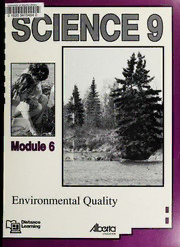Table Of ContentModule 6
Environmental Quality
Distance
ydlbcrra
Learning
EDUCATION
1
—
Science 9
Module 6
ENVIRONMENTAL QUALITY
r>0_ Distance Axaa
Learning
EDUCATION
i
—
Science 9
Student Module
Module 6
Environmental Quality
Alberta Distance Learning Centre
ISBN No. 0-7741-0692-1
ALL RIGHTS RESERVED
Copyright ® 1 992, the Crown in Right of Alberta, as represented by the Minister of Education, Alberta Education, 11160 Jasper Avenue,
Edmonton, Alberta, T5K 0L2.
All rights reserved. Additional copies may be obtained from the Learning Resources Distributing Centre.
No part of this courseware may be reproduced in any form, including photocopying (unless otherwise indicated), without the written
permission of Alberta Education.
Every effort has been made both to provide proper acknowledgement of the original source and to comply with copyright law. If cases
are identified where this has not been done, please notify Alberta Education so appropriate corrective action can be taken.
UNIVERSITY LIBRARY
ilMlVFR.«;iTY OF A1 RFRFA
Welcome to Module 61
We hope you'll enjoy your
study of Environmental Quality
To make your learning a b it
easier, a t eacher will help
guide you through the
material.
So whenever you see this icon
turn on your audiocassette
and listen.
Digitized by the Internet Archive
in 2017 with funding from
University of Alberta Libraries
https://archive.org/details/science906albe
I ^ o ntents
OVERVIEW 1
Evaluation 2
Course Overview 2
SECTION 1:
PEOPLE AND THE ENVIRONMENT 3
Activity 1 : Population Growth 4
Activity 2: Effects of Human Population Growth 6
Activity 3: Researching an Issue 9
Follow-up Activities 14
Extra Help 14
Enrichment 16
Conclusion 17
Assignment 17
SECTION 2:
GARBAGE AND WASTES 19
Activity 1: Measuring Waste 20
Activity 2: Waste Disposal 23
Follow-up Activities 25
Extra Help 25
Enrichment 26
Conclusion 27
Assignment 27
SECTION 3:
AIR AND WATER 29
Activity 1 : Pollution in the Air 30
Activity 2: Acid Rain 32
Activity 3: Pollution in the Water 34
Follow-up Activities 36
Extra Help 36
Enrichment 38
Conclusion 39
Assignment 39
Science 9 - M odule 6
SECTION 4:
WATER QUALITY 41
Activity 1: Water and Food Processing 42
Activity 2: Dealing with an Environmental Problem 43
Activity 3: Measuring Suspended Solids 47
Activity 4: Identifying Phosphates 48
Activity 5: Oxygen in Water 52
Follow-up Activities 55
Extra Help 55
Enrichment 57
Conclusion 58
Assignment 58
SECTION 5:
LIVING INDICATORS OF WATER QUALITY 59
Activity 1: Life in the Water 60
Activity 2: Sampling Invertebrates 61
Follow-up Activities 67
Extra Help 67
Enrichment 68
Conclusion 69
Assignment 69
SECTION 6:
AN ENVIRONMENTAL HEARING 71
Activity 1: Determining Viewpoints 72
Activity 2: A P ublic Hearing 76
Follow-up Activities 80
Extra Help 81
Enrichment 83
Conclusion 86
MODULE SUMMARY 86
Final Module Assignment 86
APPENDIX 87
Glossary 89
Suggested Answers 90
Science 9 - M odule 6
1
OVERVIEW
The environment is a s ubject that you hear about or read about almost every day.
When the topic is the environment, many viewpoints are expressed. How can
you decide which viewpoint or opinion is the correct one? Is there only one
correct viewpoint?
By considering perspectives and alternatives, and by evaluating the effects of
actions and the decision-making process, you can develop a p ersonal awareness
of the human impact on environmental quality.
In this module you will be introduced to the idea of environmental quality and
the role of science in monitoring that quality. You will learn that personal and
public decisions regarding environmental quality are needed. These decisions
should be backed up by knowledge about environments and environmental
impacts. You will have an opportunity to look at the long-term and short-term
impacts of human actions within different environments. You will consider air,
water, and soil quality as environmental quality indicators. You will examine a
sample of water the way that an aquatic biologist would, and you will play a
realistic role in a m ock environmental hearing.
Science 9 - M odule 6
2
Evaluation
Your mark in this module will be determined by your work in the Assignment
Booklet. You must complete all assignments. In this module you are expected to
complete five section assignments and a f inal module assignment.
The assignment breakdown is as follows:
10%
Section 1 A ssignment 15%
Section 2 A ssignment
15%
Section 3 A ssignment 10%
Section 4 A ssignment 10%
Section 5 A ssignment 40%
Final Module Assignment
TOTAL 100%
Course Overview
Science 9 c ontains six modules. The module you will be working on is
highlighted.
Science 9 - M odule 6

